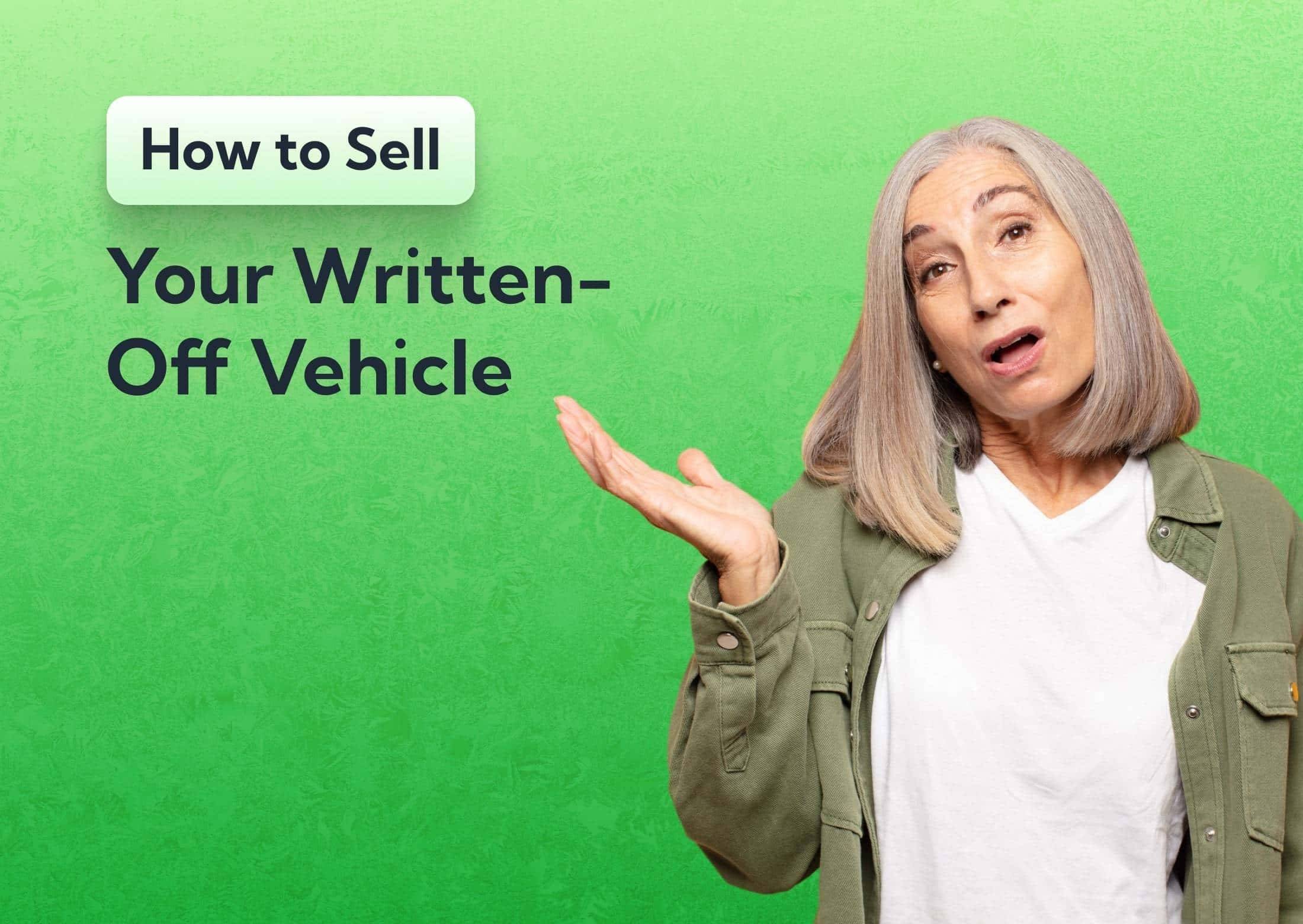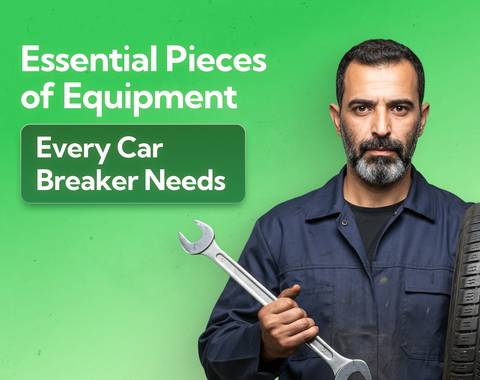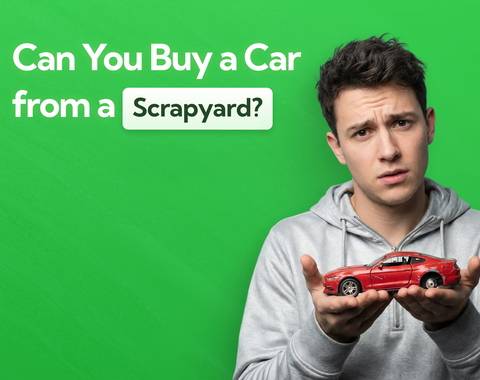How to Sell Your Written Off Vehicle
Learn how to sell a written-off car in the UK. Get insider tips on setting a price, documentation, safety checks, and negotiating with potential buyers.
Last updated: 28th October, 2025

Award-winning CEO driving growth and social impact across automotive, recycling, and technology-led enterprise platforms.

Listen to this story
A vehicle with a salvage title doesn't necessarily have to go to the scrapyard. Depending on its condition and the type of write-off your insurance company issued, you might find you can sell it and put it back on the road.
Those who find themselves in the unfortunate position of having their vehicle written off almost always wonder what they can do with it.
The insurance payout is often more than enough to purchase a new car. And it's usually the better (and more profitable) option. Insurance companies issue write-offs when they're fairly certain the vehicle in question is either a total loss or too costly to repair.
But hearing the insurance company will write off your car is frustrating if you feel you can still get some use out of it. And some cars have sentimental value, which only you can put a price on.
If you aren't ready to part ways with your beloved car just yet, or you want to do so on your own terms, we don't blame you.
The good news is you don't always have to sell your car for scrap. Under certain circumstances, you have other options.
What's in this article
What is a written-off car?
Put simply, a written-off car (or 'write-off') is one that has either been damaged beyond repair or is costlier to fix than the total market value of the vehicle.
When your insurance company writes off your car, they're telling you one of two things:
- "It's sustained so much damage we don't see a way to make it roadworthy ever again."
- "Whether we can make it roadworthy again or not, it's more expensive to do so than its total market value."
When an insurance provider issues a write-off, they do so because it's less expensive for them (and you) to pay out your insurance claim and scrap the car.
Write-Off Categories
In the UK, a car insurance company can issue a write-off as either an A, B, S or N category vehicle. In special circumstances, it may fall into categories U or X.
Whether you're allowed to keep and repair your car depends on which of these categories it falls into.
- Category A — You are legally required to scrap your car. You cannot part it out or sell it to another buyer.
- Category B — A few specifically listed parts can be removed, but you're legally obligated to scrap the car.
- Category S — Extensive damage to the structural frame or chassis renders your car a total loss. It's costly to repair, but there are no legal roadblocks to doing so.
- Category N — Your car is a total loss due to non-structural damage, but you can choose to repair it yourself.
- Category U — Unrecorded damage means your car may have further problems that aren't immediately identifiable.
- Category X — This category is used when an insurance company is unsure which of the above categories applies or if they cannot determine the extent of damage on a vehicle. Usually, the car maintains very little damage, such as when a vehicle is stolen and found shortly after.
If your goal is to sell your car, that's only an option with a Category S or N vehicle in most circumstances. Category A or B cars must go to the scrap yard, no matter what. Categories U and X require further investigation.
Leaving a Write-Off With Your Insurance Provider
Similar to selling a car on finance, you'll have a few extra hoops to jump through if your write-off vehicle has an outstanding loan balance.
When your insurance provider writes off your car, they will issue you a settlement payout depending on the circumstances, such as your car's value and the amount of damage. This is the amount they're willing to pay for it.
If they offer you the same amount (or more) than your outstanding finance, all you have to do is pay back the lending institution and get on with your day. But sometimes, this isn't how things play out. If they don't offer you enough to pay down the rest of your loan, you're in a bit of a bind.
Let's say you purchased a new car but financed £10,000 of it. You have an outstanding balance of £7,000, but the insurance company is only offering you a settlement payout of £4,000. You're still on the hook for £3,000. And that comes out of your pocket.
Until your insurer officially writes off your car, you're also responsible for your monthly payments. If you stop making them, your credit score will suffer severely. This will make it harder for you to secure financing (and favorable APR) in the future.
Can you buy back a written-off car?
If you decide you want to sell your written-off car instead of taking the settlement money, you have to buy it back from your insurer after they issue the salvage title. Once you pay an agreed-upon figure, they'll transfer ownership back to you.
You have to do this as soon as possible. Otherwise, they'll scrap your car and it'll be too late.
Again, you can only do this if the write-off is Category S or N. Once it is roadworthy again, you will have to re-register it with the DVLA and inform them it was previously written off.
What the experts say

Steven Jackson OBE
Tips to Sell a Written-Off Car
It's much harder to sell a write-off because that would mean you're selling a car without an MOT. Two out of every three car buyers in the UK wouldn't even consider buying one, according to the latest data from SMMT.
Your biggest challenge is fixing your car to the point it can achieve roadworthiness status, not just driveability that satisfies the buyer. In that sense, it's pretty much the same as selling a salvage car.
Here are a few essential tips for selling a written-off car:
Transparent Disclosure
First and foremost, you have to make sure you explicitly disclose your car is a write-off, especially if it's unroadworthy at the time you sell it. In the UK, it is a criminal offence to sell an unroadworthy vehicle to someone without their knowledge.
Since you can't drive an unroadworthy vehicle on public roads, your buyer might not even be able to drive off with it. They (or you) would have to arrange a tow.
Transparency is important no matter what kind of vehicle you're selling, but it's especially crucial here. If you're selling a damaged car (or one that was damaged in the past), buyers will want to know 100% of the time.
They will need to consider damages and repairs when evaluating the potential lifespan of the vehicle. Typically, that's a lot shorter than it would be for a car with a clean accident/claim/repair history.
Honest Communication
Honest communication goes beyond the initial disclosure. You should be as candid as possible about the car's history and any damages or repairs you made (or are planning to make).
It's a good idea to have your vehicle's entire service and maintenance records handy. We also recommend taking the car in for a third-party inspection and appraisal, which the professional can print out and sign off on.
Having conclusive evidence of your car's current status to back up your claims might help your buyers look past its turbulent history. It will also help you reiterate your car's current state and value during negotiation.
Price Consideration
Pricing your car for sale is an inexact science no matter what. It's a lot harder to value a salvage car because there's no real ‘market value’. A write-off car is much more complicated to repair than a regular used car, and the costs of repairs can be high.
Plus, your buyers will know it's a write-off and will see it through a more critical lens, whether they try to or not. They will definitely drive down the asking price if they think it needs extra work.
Whether the repair work seriously isn't finished or they just have a 'hunch', it doesn't matter. It only matters what the general market is willing to pay for it. And unfortunately, you're fighting an uphill battle there.
Typically, calculating a written-off car's value involves contacting your insurance provider, evaluating the damage yourself, getting it appraised and several smaller steps in between.
Market Research
You'll need to do market research no matter what. Start by using our free car valuation calculator to see what similar vehicles are selling for.
Of course, you'll need to go lower. This will just give you a roundabout estimate of the high end.
You can also browse classifieds and online listing sites like Facebook Marketplace to get a better idea of what kind of demand and prices you're dealing with.
If you set the right expectations from the start, it will be much easier to find someone who's interested in buying your written-off car.
Negotiation Flexibility
Put yourself in your buyer's shoes. They're practically doing you a favor by taking it off your hands. And they're taking a risk for doing so.
The reality of selling a written-off car is it's a lot of physical effort on your end. And you almost certainly aren't turning a profit when it's all said and done.
So you're working hard to manage listings, visit dealerships, and meet with private buyers. You've spent several weeks fixing it. And once you sell it, you'll have a net negative in your pocket to show for it.
The only real exception to this is an instance where the insurance payout is low, and your car was written off due to unusual circumstances rather than the vehicle damage itself.
It's better to keep looking than sell at an unfair loss. But flexibility goes a long way in any negotiation. Don't expect too much from the buyers, but don't be afraid to walk away if they're not offering a fair price.
Target Audience
Once you get your car back to roadworthiness, you actually have a lot of options for selling it. Your target audience is limited to those who would buy a car that was previously written off, but that just means you'll need to do a bit of extra legwork.
- Selling your car to a dealership — If you sell to a dealership, you won't get the best price for it. But it'll be a fast transaction. They'll handle the V5C transfer and notify the DVLA on your behalf. Not all dealerships buy salvage cars, so it's a good idea to
- Selling your car online — There are dozens of online car buying websites that would be happy to take your car. Some will take it in any condition, while others have certain standards.
- Selling your car privately — The private market is the best place to sell your car and get the most for it. It's the most effort, but hard work pays off.
- Parting out your car — It's sometimes more profitable to part out your written-off car. If you have lots of valuable parts in working condition (e.g., engine, transmission, catalytic converter, stereo), listing them individually, selling them to mechanics and junkyards, or even exporting them can net you a decent chunk of change.
Carefully consider your car's condition, desirability and in-demandness when mapping out your target audience.
You'll have an easy time selling your car to a dealership if it's a new model they know they can move off the forecourt in a few weeks or less. If you're selling a non-running car, most regular buyers won't want it.
Online Listings
There are plenty of great websites to sell your car. The ones you choose will depend on its condition and the audience you're targeting.
- Regular online classifieds — Sites like AutoTrader and Gumtree let you list your car and instantly gain exposure to thousands of potentially interested buyers. It's best to sell here if your car is in fantastic condition.
- Specialty online classifieds — If you're selling a modified car or selling a classic car, you should look into niche classified sites to improve your chances of finding and connecting with your target buyers.
- Online marketplaces — It's generally best to sell a damaged car on places like Facebook Marketplace and eBay Motors because they're less formal. You won't get the most money for it, but you'll find buyers who would want it for all kinds of reasons.
Be aware selling a written-off car makes you a target for car buying and selling scams. Potential scammers will see you as 'more vulnerable' because they know write-offs are harder to sell. They may attempt to prey on your presumed desperation to get rid of the vehicle.
If you're listing your car on classifieds and marketplaces, be very skeptical of any buyers who offer to pay a large sum more than the asking price or offer to connect you with an interested buyer for a finder's fee. And don't transfer the keys or V5C/2 until the money is in your account and verified.
Quality Photographs
The photos you take of your vehicle will be the first impression for your prospective buyers. Their quality will largely determine whether they click on your listing or not.
Here are a few best practices when photographing your car:
- Clean it thoroughly. Get rid of any dirt, dust and debris before you start taking pictures.
- Take a variety of shots. Include full profile and close-up shots from different angles.
- Make sure the background is clear of obstructions and distractions.
- Use natural light when possible instead of flash. This can make your car look a lot better in pictures.
- If the car has any flaws, be sure to highlight them in your photos so your buyers are informed.
- Place extra emphasis on the areas that were damaged in the accident or affected in the incident related to your write-off.
Before taking pictures, prepare your car for sale by cleaning it out and getting it detailed. Spend the extra money to make it look nice if you want to fetch the highest sale price.
Thorough Documentation
There are several documents you need to sell your car. For a write-off, you'll need a bit of extra documentation.
This includes:
- V5C logbook — The most important document in the sale. You will use the V5C to transfer ownership to the buyer and tell the DVLA you've sold your car. It’s not a good idea to try selling a car without a V5C.
- MOT certificate — Every car older than three years needs a valid MOT certificate to drive on UK roads. Without it, your buyer can't drive (or even tax) your vehicle after purchasing it from you.
- Service history — A complete and up-to-date service history adds value to your car. It shows buyers you've taken good care of it.
- Recent repair bills — If your car was involved in an accident or other incident that led to it being written off, you'll need to provide records of any repairs completed after the incident.
- Parts receipts — After replacing damaged parts on your write-off, proving they're genuine will make it easier to sell it. Plus, it'll tell buyers you took it to a reputable garage or dealer for repairs.
- Insurance claim history — To give your buyer more context surrounding your insurance company's decision to write off your vehicle, it's a good idea to keep your insurance claim documents handy while answering questions.
Without all these documents, you won't get the best price for your car. If you lost your V5C, you can replace it online using the DVLA's duplicate logbook service for £25.
Mechanical and Safety Aspects
Most buyers who submit enquiries will immediately question your vehicle's safety. And who could blame them? It was involved in an incident that rendered it a total loss, after all.
To ensure your buyers see the car in the best light, take it to an independent garage and have them check out the mechanical and safety aspects after fixing it.
Have them draw up an official report, sign off on it and send you home with it.
Wrapping Up
To recap, here's a quick checklist when selling your written-off car:
- Do a cost-benefit analysis when deciding whether to do so.
- Have an independent garage check out the car's mechanical and safety aspects before putting it up for sale.
- Gather all necessary documents ahead of time.
- Prepare to answer additional questions.
- Set a reasonable price based on your car's condition, desirability and in-demandness.
- List it on websites that cater to your target audience.
- Take quality photos of the vehicle for listings.
- Be flexible during the negotiation process.
Selling a write-off isn't the easiest route to go, but it's certainly the most rewarding if you disagree with the insurance company's settlement figure or want to sell it on your own terms.
Frequently asked questions
Once you buy your written-off car back from the insurance company, you can do whatever you want with it. That means you can take the DIY route if you choose. Keep in mind an interested buyer will want to see parts receipts from an authorised garage or dealership. Even if you're an expert mechanic, you may not be able to convince a buyer that your vehicle is safe enough for the road without parts receipts from a reputable repair centre.
It is not illegal to sell a written-off car in the UK, but you must inform potential buyers that it was previously labelled as such. If it is not roadworthy, you must also disclose that ahead of the sale. Your buyer would then have to arrange a tow when picking up your car.
About Car.co.uk

Share on
Latest news & blogs










